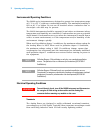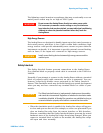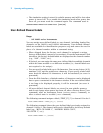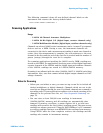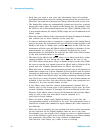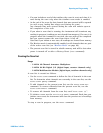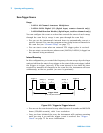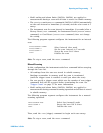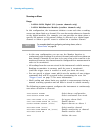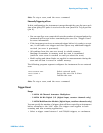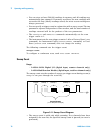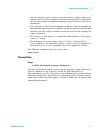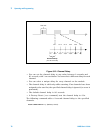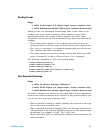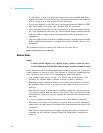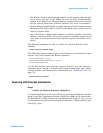
74 L4400 User’s Guide
3 Operating and Programming
Scanning on Alarm
Usage:
• L4450A 64- Bit Digital I/O (counter channels only)
• L4452A Multifunction Module (totalizer channels only)
In this configuration, the instrument initiates a scan each time a reading
crosses an alarm limit on a channel. You can also assign alarms to channels
on the digital modules. For example, you can generate an alarm when a
specific bit pattern or bit pattern change is detected on a digital input
channel or when a specific count is reached on a totalizer channel.
• In this scan configuration, you can use the Monitor function to
continuously take readings on a selected channel and wait for an alarm on
that channel. Channels do not have to be part of an active scan list to be
monitored; however, the channel must be configured for a measurement in
order to be monitored.
• All readings from the scan are stored in the instrument’s volatile memory.
Readings accumulate in memory until the scan is terminated
(until the trigger count is reached or until you abort the scan).
• You can specify a trigger count which sets the number of scan trigger
commands that will be accepted before terminating the scan. See
“Trigger Count" on page 75 for more information.
• Mx+B scaling and alarm limits are applied to measurements during a
manual scanning operation and all data is stored in volatile memory.
The following program segment configures the instrument to continuously
scan when an alarm is detected.
NOTE
For complete details on configuring and using alarms, refer to
“Alarm Limits" on page 84.
TRIG:SOURCE ALARM1
TRIG:SOURCE:ALARM CONT
CALC:LIM:UPPER 10.25,(@1003)
CALC:LIM:UPPER:STATE ON,(@1003)
OUTPUT:ALARM1:SOURCE (@1003)
ROUT:MON:CHAN (@1003)
ROUT:MON:CHAN:ENABLE ON,(@1003)
ROUT:MON:STATE ON
INIT
Select alarm configuration
Select continuous scan mode
Set upper alarm limit
Enable alarms
Report alarms on Alarm 1
Select monitor channel
Enable monitoring on channel
Enable monitor mode
Initiate the scan



